Report on Human Rights Issues, Policies, and Advocacy in Philippines
VerifiedAdded on 2023/06/08
|14
|3815
|486
Report
AI Summary
This report delves into the human rights situation in the Philippines, with a specific focus on the issue of extrajudicial executions. It begins by establishing the concept of human rights and highlighting the various human rights challenges faced by the Philippines, including issues related to children's rights, HIV epidemic rights, gender inequality, freedom of expression, the death penalty, and extrajudicial executions. The report then examines existing human rights policies in the Philippines, particularly those related to the Commission on Human Rights, such as CHR (V) A2015 – 003 and CHR (V) A2015 – 004, analyzing their effectiveness in addressing extrajudicial killings. Furthermore, the report proposes advocacy actions based on Article XIII of the Philippine law, specifically Sections 17 and 18, emphasizing the role of the Commission on Human Rights in investigating violations and providing legal protection. The expected outcome of these advocacy efforts is to ensure that the Philippine government respects human rights and provides a secure environment for its citizens. The report concludes by stressing the importance of upholding human rights to foster a peaceful and just society in the Philippines.
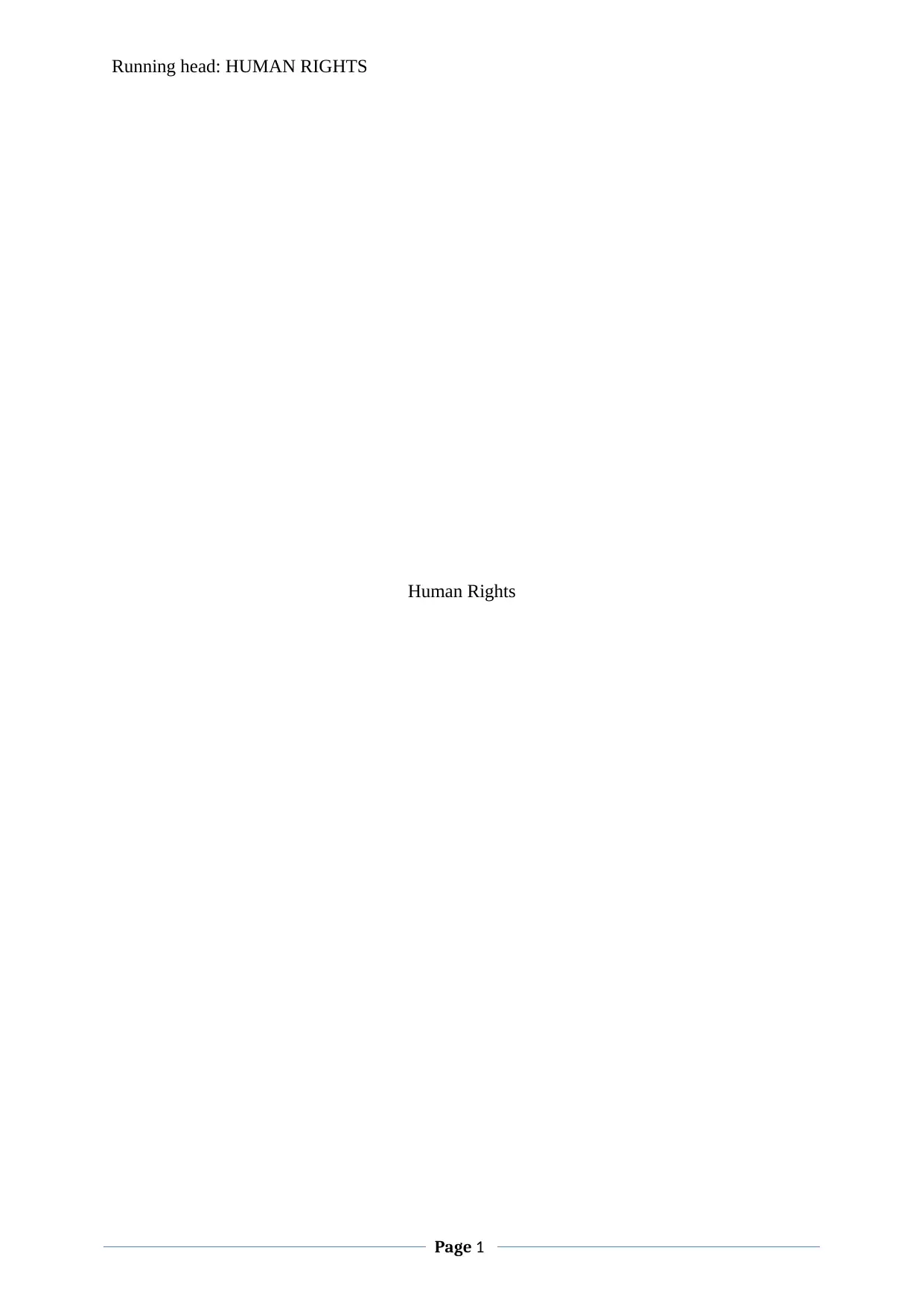
Running head: HUMAN RIGHTS
Human Rights
Page 1
Human Rights
Page 1
Paraphrase This Document
Need a fresh take? Get an instant paraphrase of this document with our AI Paraphraser
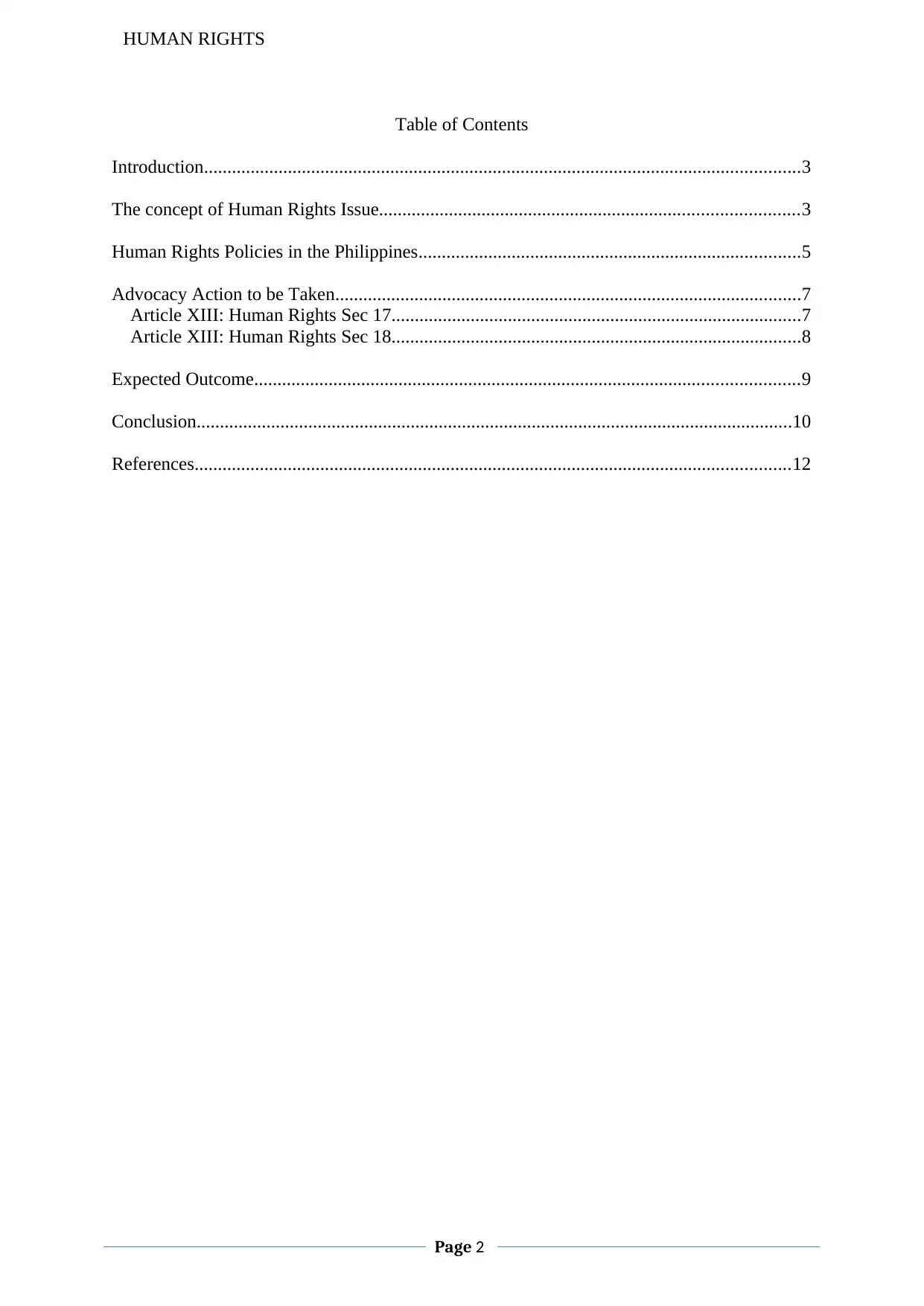
HUMAN RIGHTS
Table of Contents
Introduction................................................................................................................................3
The concept of Human Rights Issue..........................................................................................3
Human Rights Policies in the Philippines..................................................................................5
Advocacy Action to be Taken....................................................................................................7
Article XIII: Human Rights Sec 17........................................................................................7
Article XIII: Human Rights Sec 18........................................................................................8
Expected Outcome.....................................................................................................................9
Conclusion................................................................................................................................10
References................................................................................................................................12
Page 2
Table of Contents
Introduction................................................................................................................................3
The concept of Human Rights Issue..........................................................................................3
Human Rights Policies in the Philippines..................................................................................5
Advocacy Action to be Taken....................................................................................................7
Article XIII: Human Rights Sec 17........................................................................................7
Article XIII: Human Rights Sec 18........................................................................................8
Expected Outcome.....................................................................................................................9
Conclusion................................................................................................................................10
References................................................................................................................................12
Page 2
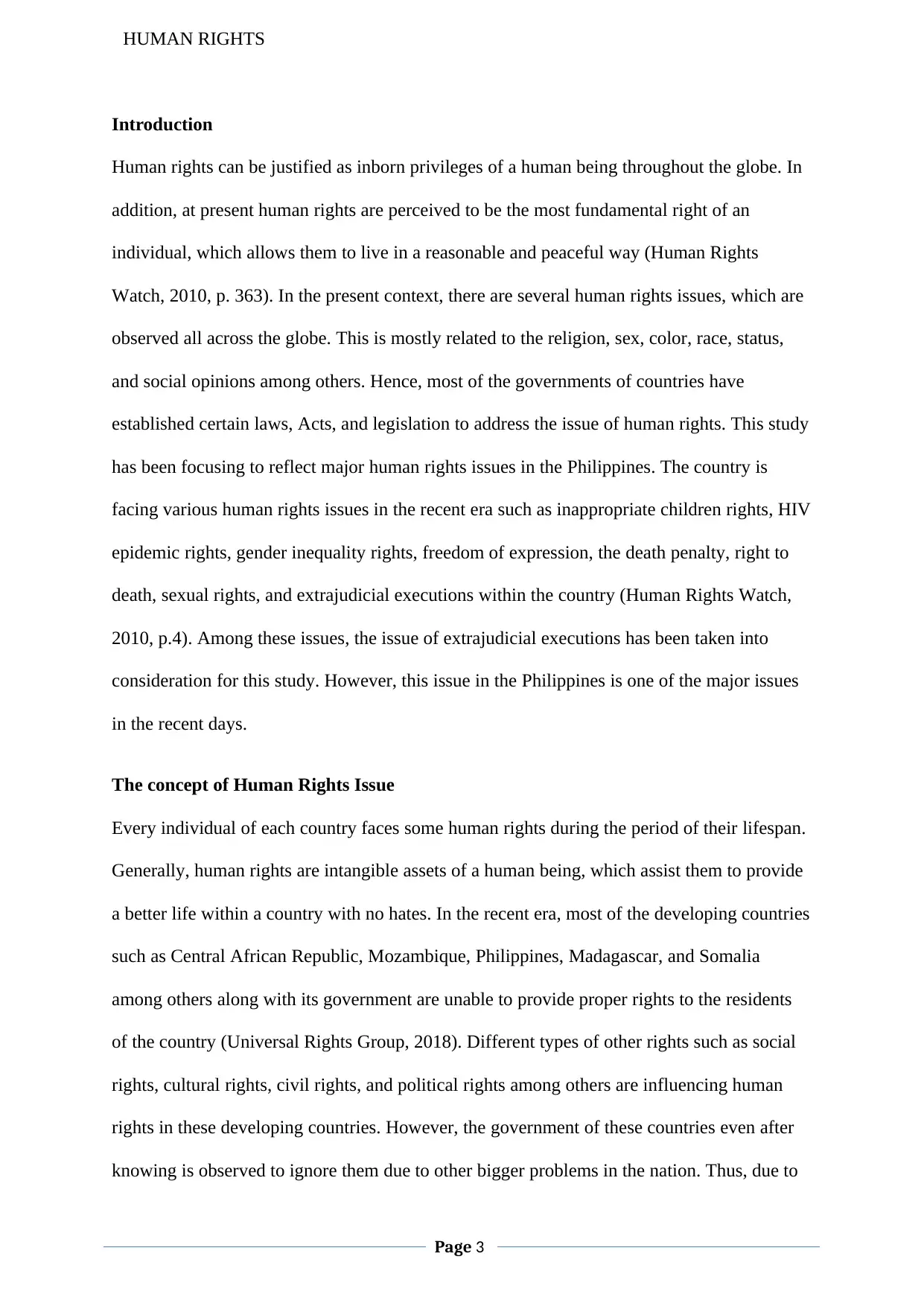
HUMAN RIGHTS
Introduction
Human rights can be justified as inborn privileges of a human being throughout the globe. In
addition, at present human rights are perceived to be the most fundamental right of an
individual, which allows them to live in a reasonable and peaceful way (Human Rights
Watch, 2010, p. 363). In the present context, there are several human rights issues, which are
observed all across the globe. This is mostly related to the religion, sex, color, race, status,
and social opinions among others. Hence, most of the governments of countries have
established certain laws, Acts, and legislation to address the issue of human rights. This study
has been focusing to reflect major human rights issues in the Philippines. The country is
facing various human rights issues in the recent era such as inappropriate children rights, HIV
epidemic rights, gender inequality rights, freedom of expression, the death penalty, right to
death, sexual rights, and extrajudicial executions within the country (Human Rights Watch,
2010, p.4). Among these issues, the issue of extrajudicial executions has been taken into
consideration for this study. However, this issue in the Philippines is one of the major issues
in the recent days.
The concept of Human Rights Issue
Every individual of each country faces some human rights during the period of their lifespan.
Generally, human rights are intangible assets of a human being, which assist them to provide
a better life within a country with no hates. In the recent era, most of the developing countries
such as Central African Republic, Mozambique, Philippines, Madagascar, and Somalia
among others along with its government are unable to provide proper rights to the residents
of the country (Universal Rights Group, 2018). Different types of other rights such as social
rights, cultural rights, civil rights, and political rights among others are influencing human
rights in these developing countries. However, the government of these countries even after
knowing is observed to ignore them due to other bigger problems in the nation. Thus, due to
Page 3
Introduction
Human rights can be justified as inborn privileges of a human being throughout the globe. In
addition, at present human rights are perceived to be the most fundamental right of an
individual, which allows them to live in a reasonable and peaceful way (Human Rights
Watch, 2010, p. 363). In the present context, there are several human rights issues, which are
observed all across the globe. This is mostly related to the religion, sex, color, race, status,
and social opinions among others. Hence, most of the governments of countries have
established certain laws, Acts, and legislation to address the issue of human rights. This study
has been focusing to reflect major human rights issues in the Philippines. The country is
facing various human rights issues in the recent era such as inappropriate children rights, HIV
epidemic rights, gender inequality rights, freedom of expression, the death penalty, right to
death, sexual rights, and extrajudicial executions within the country (Human Rights Watch,
2010, p.4). Among these issues, the issue of extrajudicial executions has been taken into
consideration for this study. However, this issue in the Philippines is one of the major issues
in the recent days.
The concept of Human Rights Issue
Every individual of each country faces some human rights during the period of their lifespan.
Generally, human rights are intangible assets of a human being, which assist them to provide
a better life within a country with no hates. In the recent era, most of the developing countries
such as Central African Republic, Mozambique, Philippines, Madagascar, and Somalia
among others along with its government are unable to provide proper rights to the residents
of the country (Universal Rights Group, 2018). Different types of other rights such as social
rights, cultural rights, civil rights, and political rights among others are influencing human
rights in these developing countries. However, the government of these countries even after
knowing is observed to ignore them due to other bigger problems in the nation. Thus, due to
Page 3
⊘ This is a preview!⊘
Do you want full access?
Subscribe today to unlock all pages.

Trusted by 1+ million students worldwide
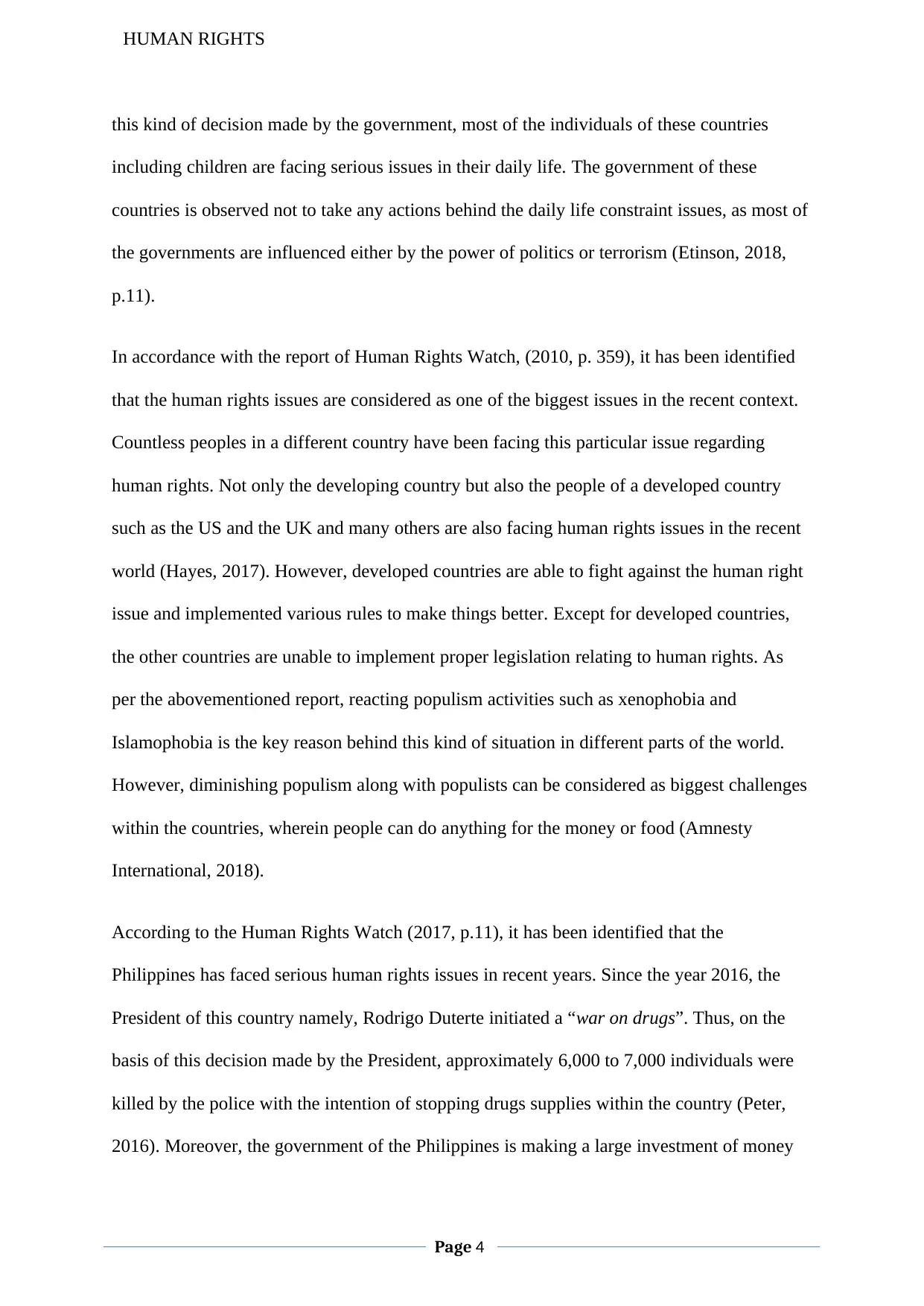
HUMAN RIGHTS
this kind of decision made by the government, most of the individuals of these countries
including children are facing serious issues in their daily life. The government of these
countries is observed not to take any actions behind the daily life constraint issues, as most of
the governments are influenced either by the power of politics or terrorism (Etinson, 2018,
p.11).
In accordance with the report of Human Rights Watch, (2010, p. 359), it has been identified
that the human rights issues are considered as one of the biggest issues in the recent context.
Countless peoples in a different country have been facing this particular issue regarding
human rights. Not only the developing country but also the people of a developed country
such as the US and the UK and many others are also facing human rights issues in the recent
world (Hayes, 2017). However, developed countries are able to fight against the human right
issue and implemented various rules to make things better. Except for developed countries,
the other countries are unable to implement proper legislation relating to human rights. As
per the abovementioned report, reacting populism activities such as xenophobia and
Islamophobia is the key reason behind this kind of situation in different parts of the world.
However, diminishing populism along with populists can be considered as biggest challenges
within the countries, wherein people can do anything for the money or food (Amnesty
International, 2018).
According to the Human Rights Watch (2017, p.11), it has been identified that the
Philippines has faced serious human rights issues in recent years. Since the year 2016, the
President of this country namely, Rodrigo Duterte initiated a “war on drugs”. Thus, on the
basis of this decision made by the President, approximately 6,000 to 7,000 individuals were
killed by the police with the intention of stopping drugs supplies within the country (Peter,
2016). Moreover, the government of the Philippines is making a large investment of money
Page 4
this kind of decision made by the government, most of the individuals of these countries
including children are facing serious issues in their daily life. The government of these
countries is observed not to take any actions behind the daily life constraint issues, as most of
the governments are influenced either by the power of politics or terrorism (Etinson, 2018,
p.11).
In accordance with the report of Human Rights Watch, (2010, p. 359), it has been identified
that the human rights issues are considered as one of the biggest issues in the recent context.
Countless peoples in a different country have been facing this particular issue regarding
human rights. Not only the developing country but also the people of a developed country
such as the US and the UK and many others are also facing human rights issues in the recent
world (Hayes, 2017). However, developed countries are able to fight against the human right
issue and implemented various rules to make things better. Except for developed countries,
the other countries are unable to implement proper legislation relating to human rights. As
per the abovementioned report, reacting populism activities such as xenophobia and
Islamophobia is the key reason behind this kind of situation in different parts of the world.
However, diminishing populism along with populists can be considered as biggest challenges
within the countries, wherein people can do anything for the money or food (Amnesty
International, 2018).
According to the Human Rights Watch (2017, p.11), it has been identified that the
Philippines has faced serious human rights issues in recent years. Since the year 2016, the
President of this country namely, Rodrigo Duterte initiated a “war on drugs”. Thus, on the
basis of this decision made by the President, approximately 6,000 to 7,000 individuals were
killed by the police with the intention of stopping drugs supplies within the country (Peter,
2016). Moreover, the government of the Philippines is making a large investment of money
Page 4
Paraphrase This Document
Need a fresh take? Get an instant paraphrase of this document with our AI Paraphraser
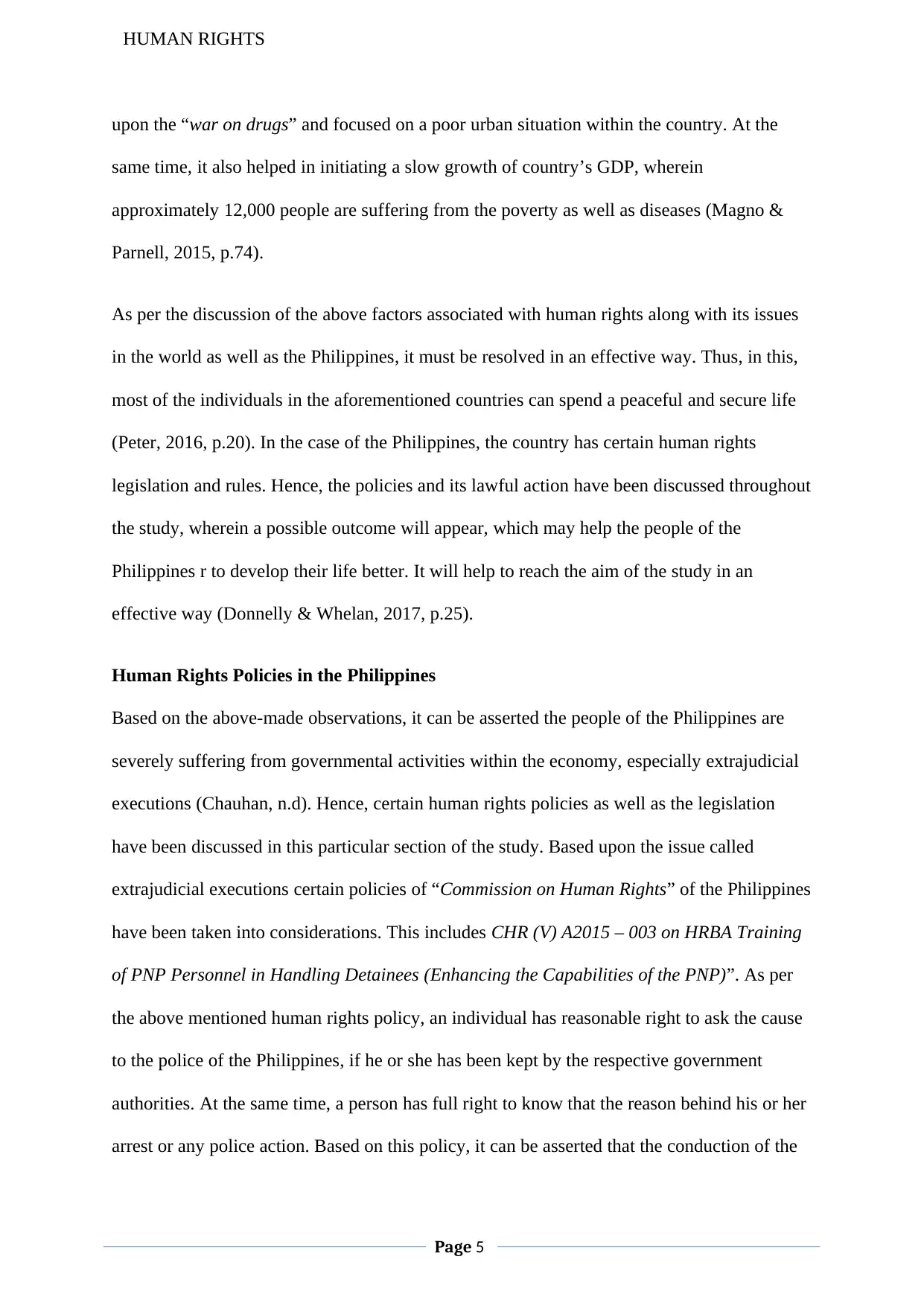
HUMAN RIGHTS
upon the “war on drugs” and focused on a poor urban situation within the country. At the
same time, it also helped in initiating a slow growth of country’s GDP, wherein
approximately 12,000 people are suffering from the poverty as well as diseases (Magno &
Parnell, 2015, p.74).
As per the discussion of the above factors associated with human rights along with its issues
in the world as well as the Philippines, it must be resolved in an effective way. Thus, in this,
most of the individuals in the aforementioned countries can spend a peaceful and secure life
(Peter, 2016, p.20). In the case of the Philippines, the country has certain human rights
legislation and rules. Hence, the policies and its lawful action have been discussed throughout
the study, wherein a possible outcome will appear, which may help the people of the
Philippines r to develop their life better. It will help to reach the aim of the study in an
effective way (Donnelly & Whelan, 2017, p.25).
Human Rights Policies in the Philippines
Based on the above-made observations, it can be asserted the people of the Philippines are
severely suffering from governmental activities within the economy, especially extrajudicial
executions (Chauhan, n.d). Hence, certain human rights policies as well as the legislation
have been discussed in this particular section of the study. Based upon the issue called
extrajudicial executions certain policies of “Commission on Human Rights” of the Philippines
have been taken into considerations. This includes CHR (V) A2015 – 003 on HRBA Training
of PNP Personnel in Handling Detainees (Enhancing the Capabilities of the PNP)”. As per
the above mentioned human rights policy, an individual has reasonable right to ask the cause
to the police of the Philippines, if he or she has been kept by the respective government
authorities. At the same time, a person has full right to know that the reason behind his or her
arrest or any police action. Based on this policy, it can be asserted that the conduction of the
Page 5
upon the “war on drugs” and focused on a poor urban situation within the country. At the
same time, it also helped in initiating a slow growth of country’s GDP, wherein
approximately 12,000 people are suffering from the poverty as well as diseases (Magno &
Parnell, 2015, p.74).
As per the discussion of the above factors associated with human rights along with its issues
in the world as well as the Philippines, it must be resolved in an effective way. Thus, in this,
most of the individuals in the aforementioned countries can spend a peaceful and secure life
(Peter, 2016, p.20). In the case of the Philippines, the country has certain human rights
legislation and rules. Hence, the policies and its lawful action have been discussed throughout
the study, wherein a possible outcome will appear, which may help the people of the
Philippines r to develop their life better. It will help to reach the aim of the study in an
effective way (Donnelly & Whelan, 2017, p.25).
Human Rights Policies in the Philippines
Based on the above-made observations, it can be asserted the people of the Philippines are
severely suffering from governmental activities within the economy, especially extrajudicial
executions (Chauhan, n.d). Hence, certain human rights policies as well as the legislation
have been discussed in this particular section of the study. Based upon the issue called
extrajudicial executions certain policies of “Commission on Human Rights” of the Philippines
have been taken into considerations. This includes CHR (V) A2015 – 003 on HRBA Training
of PNP Personnel in Handling Detainees (Enhancing the Capabilities of the PNP)”. As per
the above mentioned human rights policy, an individual has reasonable right to ask the cause
to the police of the Philippines, if he or she has been kept by the respective government
authorities. At the same time, a person has full right to know that the reason behind his or her
arrest or any police action. Based on this policy, it can be asserted that the conduction of the
Page 5
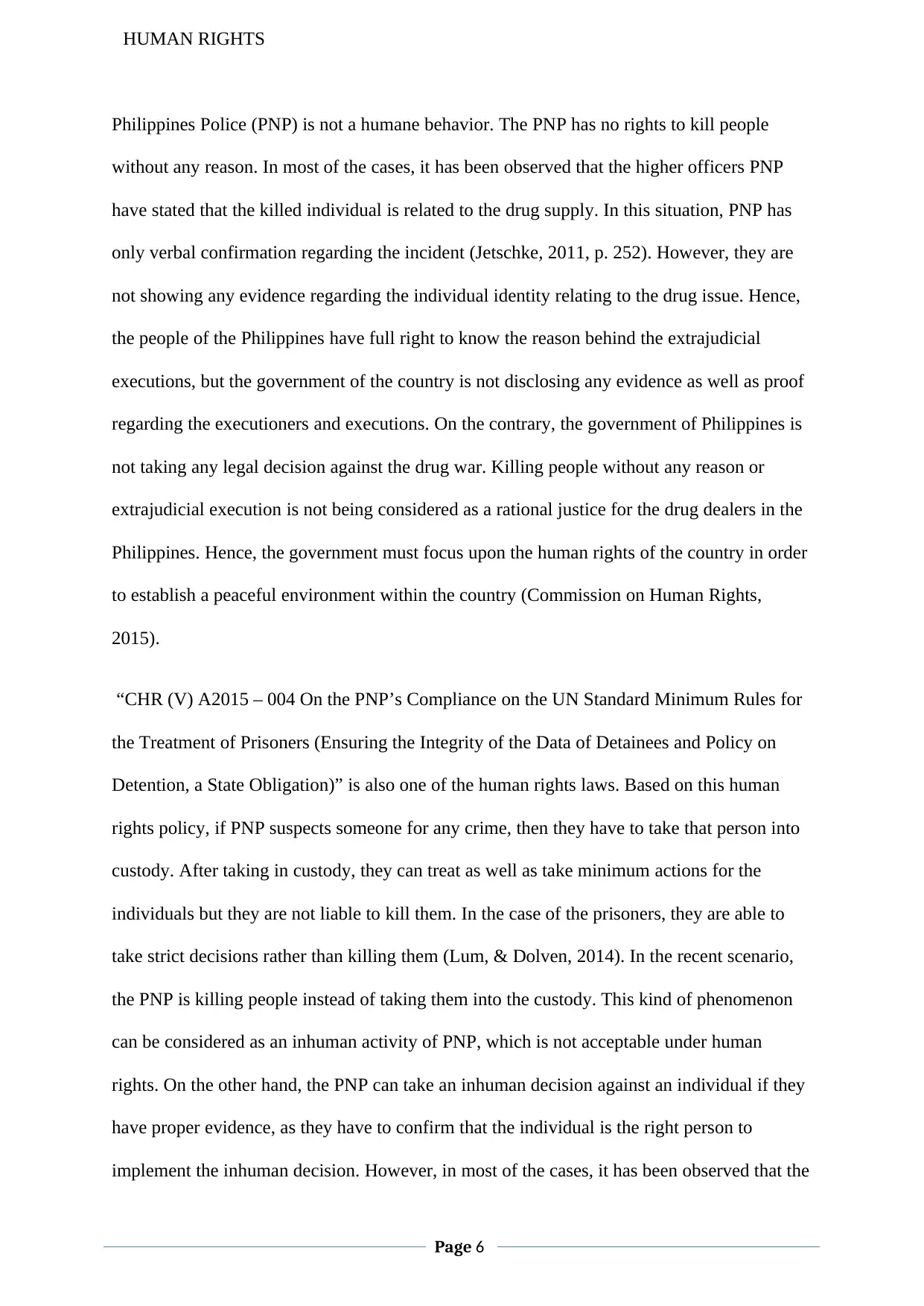
HUMAN RIGHTS
Philippines Police (PNP) is not a humane behavior. The PNP has no rights to kill people
without any reason. In most of the cases, it has been observed that the higher officers PNP
have stated that the killed individual is related to the drug supply. In this situation, PNP has
only verbal confirmation regarding the incident (Jetschke, 2011, p. 252). However, they are
not showing any evidence regarding the individual identity relating to the drug issue. Hence,
the people of the Philippines have full right to know the reason behind the extrajudicial
executions, but the government of the country is not disclosing any evidence as well as proof
regarding the executioners and executions. On the contrary, the government of Philippines is
not taking any legal decision against the drug war. Killing people without any reason or
extrajudicial execution is not being considered as a rational justice for the drug dealers in the
Philippines. Hence, the government must focus upon the human rights of the country in order
to establish a peaceful environment within the country (Commission on Human Rights,
2015).
“CHR (V) A2015 – 004 On the PNP’s Compliance on the UN Standard Minimum Rules for
the Treatment of Prisoners (Ensuring the Integrity of the Data of Detainees and Policy on
Detention, a State Obligation)” is also one of the human rights laws. Based on this human
rights policy, if PNP suspects someone for any crime, then they have to take that person into
custody. After taking in custody, they can treat as well as take minimum actions for the
individuals but they are not liable to kill them. In the case of the prisoners, they are able to
take strict decisions rather than killing them (Lum, & Dolven, 2014). In the recent scenario,
the PNP is killing people instead of taking them into the custody. This kind of phenomenon
can be considered as an inhuman activity of PNP, which is not acceptable under human
rights. On the other hand, the PNP can take an inhuman decision against an individual if they
have proper evidence, as they have to confirm that the individual is the right person to
implement the inhuman decision. However, in most of the cases, it has been observed that the
Page 6
Philippines Police (PNP) is not a humane behavior. The PNP has no rights to kill people
without any reason. In most of the cases, it has been observed that the higher officers PNP
have stated that the killed individual is related to the drug supply. In this situation, PNP has
only verbal confirmation regarding the incident (Jetschke, 2011, p. 252). However, they are
not showing any evidence regarding the individual identity relating to the drug issue. Hence,
the people of the Philippines have full right to know the reason behind the extrajudicial
executions, but the government of the country is not disclosing any evidence as well as proof
regarding the executioners and executions. On the contrary, the government of Philippines is
not taking any legal decision against the drug war. Killing people without any reason or
extrajudicial execution is not being considered as a rational justice for the drug dealers in the
Philippines. Hence, the government must focus upon the human rights of the country in order
to establish a peaceful environment within the country (Commission on Human Rights,
2015).
“CHR (V) A2015 – 004 On the PNP’s Compliance on the UN Standard Minimum Rules for
the Treatment of Prisoners (Ensuring the Integrity of the Data of Detainees and Policy on
Detention, a State Obligation)” is also one of the human rights laws. Based on this human
rights policy, if PNP suspects someone for any crime, then they have to take that person into
custody. After taking in custody, they can treat as well as take minimum actions for the
individuals but they are not liable to kill them. In the case of the prisoners, they are able to
take strict decisions rather than killing them (Lum, & Dolven, 2014). In the recent scenario,
the PNP is killing people instead of taking them into the custody. This kind of phenomenon
can be considered as an inhuman activity of PNP, which is not acceptable under human
rights. On the other hand, the PNP can take an inhuman decision against an individual if they
have proper evidence, as they have to confirm that the individual is the right person to
implement the inhuman decision. However, in most of the cases, it has been observed that the
Page 6
⊘ This is a preview!⊘
Do you want full access?
Subscribe today to unlock all pages.

Trusted by 1+ million students worldwide
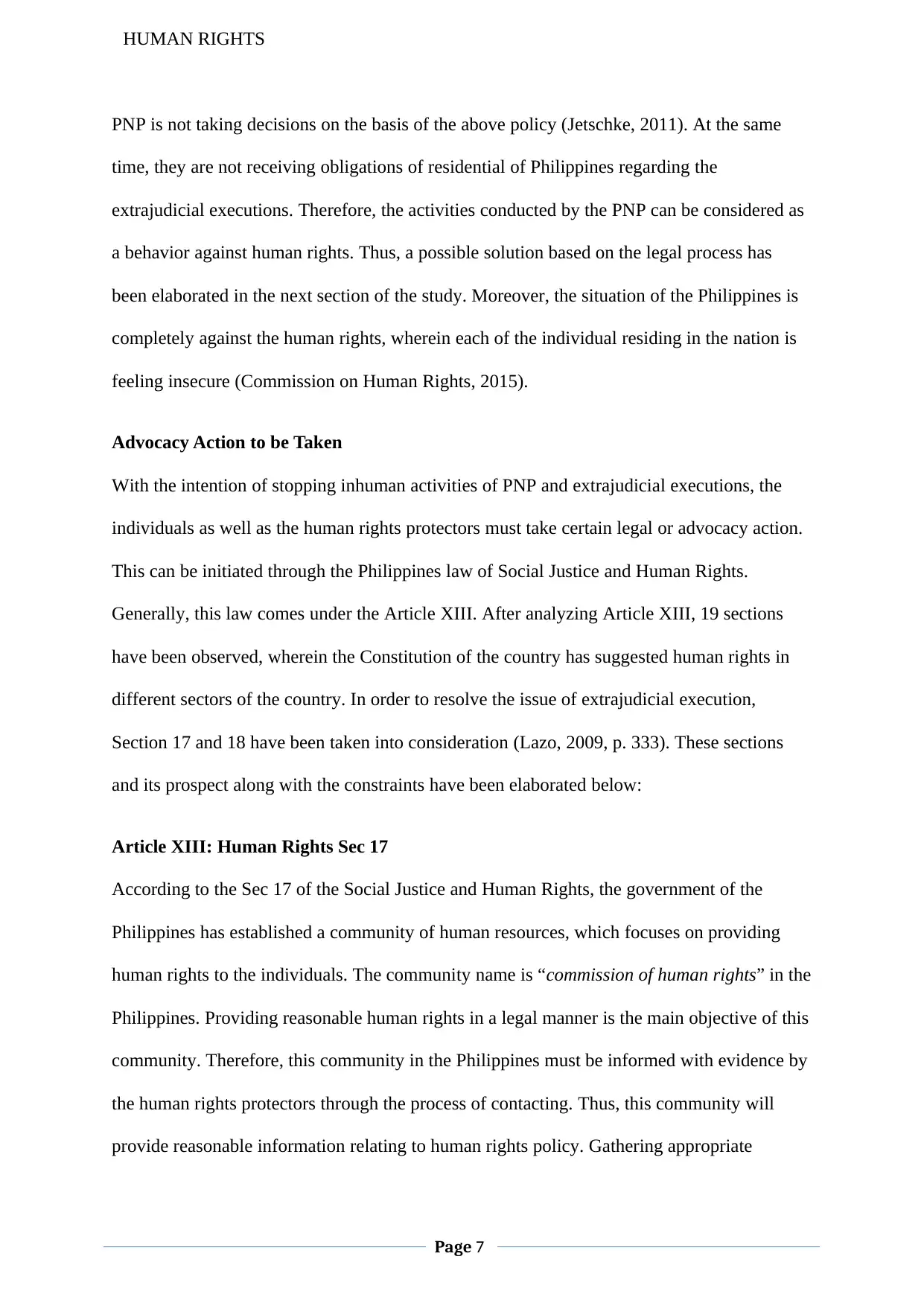
HUMAN RIGHTS
PNP is not taking decisions on the basis of the above policy (Jetschke, 2011). At the same
time, they are not receiving obligations of residential of Philippines regarding the
extrajudicial executions. Therefore, the activities conducted by the PNP can be considered as
a behavior against human rights. Thus, a possible solution based on the legal process has
been elaborated in the next section of the study. Moreover, the situation of the Philippines is
completely against the human rights, wherein each of the individual residing in the nation is
feeling insecure (Commission on Human Rights, 2015).
Advocacy Action to be Taken
With the intention of stopping inhuman activities of PNP and extrajudicial executions, the
individuals as well as the human rights protectors must take certain legal or advocacy action.
This can be initiated through the Philippines law of Social Justice and Human Rights.
Generally, this law comes under the Article XIII. After analyzing Article XIII, 19 sections
have been observed, wherein the Constitution of the country has suggested human rights in
different sectors of the country. In order to resolve the issue of extrajudicial execution,
Section 17 and 18 have been taken into consideration (Lazo, 2009, p. 333). These sections
and its prospect along with the constraints have been elaborated below:
Article XIII: Human Rights Sec 17
According to the Sec 17 of the Social Justice and Human Rights, the government of the
Philippines has established a community of human resources, which focuses on providing
human rights to the individuals. The community name is “commission of human rights” in the
Philippines. Providing reasonable human rights in a legal manner is the main objective of this
community. Therefore, this community in the Philippines must be informed with evidence by
the human rights protectors through the process of contacting. Thus, this community will
provide reasonable information relating to human rights policy. Gathering appropriate
Page 7
PNP is not taking decisions on the basis of the above policy (Jetschke, 2011). At the same
time, they are not receiving obligations of residential of Philippines regarding the
extrajudicial executions. Therefore, the activities conducted by the PNP can be considered as
a behavior against human rights. Thus, a possible solution based on the legal process has
been elaborated in the next section of the study. Moreover, the situation of the Philippines is
completely against the human rights, wherein each of the individual residing in the nation is
feeling insecure (Commission on Human Rights, 2015).
Advocacy Action to be Taken
With the intention of stopping inhuman activities of PNP and extrajudicial executions, the
individuals as well as the human rights protectors must take certain legal or advocacy action.
This can be initiated through the Philippines law of Social Justice and Human Rights.
Generally, this law comes under the Article XIII. After analyzing Article XIII, 19 sections
have been observed, wherein the Constitution of the country has suggested human rights in
different sectors of the country. In order to resolve the issue of extrajudicial execution,
Section 17 and 18 have been taken into consideration (Lazo, 2009, p. 333). These sections
and its prospect along with the constraints have been elaborated below:
Article XIII: Human Rights Sec 17
According to the Sec 17 of the Social Justice and Human Rights, the government of the
Philippines has established a community of human resources, which focuses on providing
human rights to the individuals. The community name is “commission of human rights” in the
Philippines. Providing reasonable human rights in a legal manner is the main objective of this
community. Therefore, this community in the Philippines must be informed with evidence by
the human rights protectors through the process of contacting. Thus, this community will
provide reasonable information relating to human rights policy. Gathering appropriate
Page 7
Paraphrase This Document
Need a fresh take? Get an instant paraphrase of this document with our AI Paraphraser
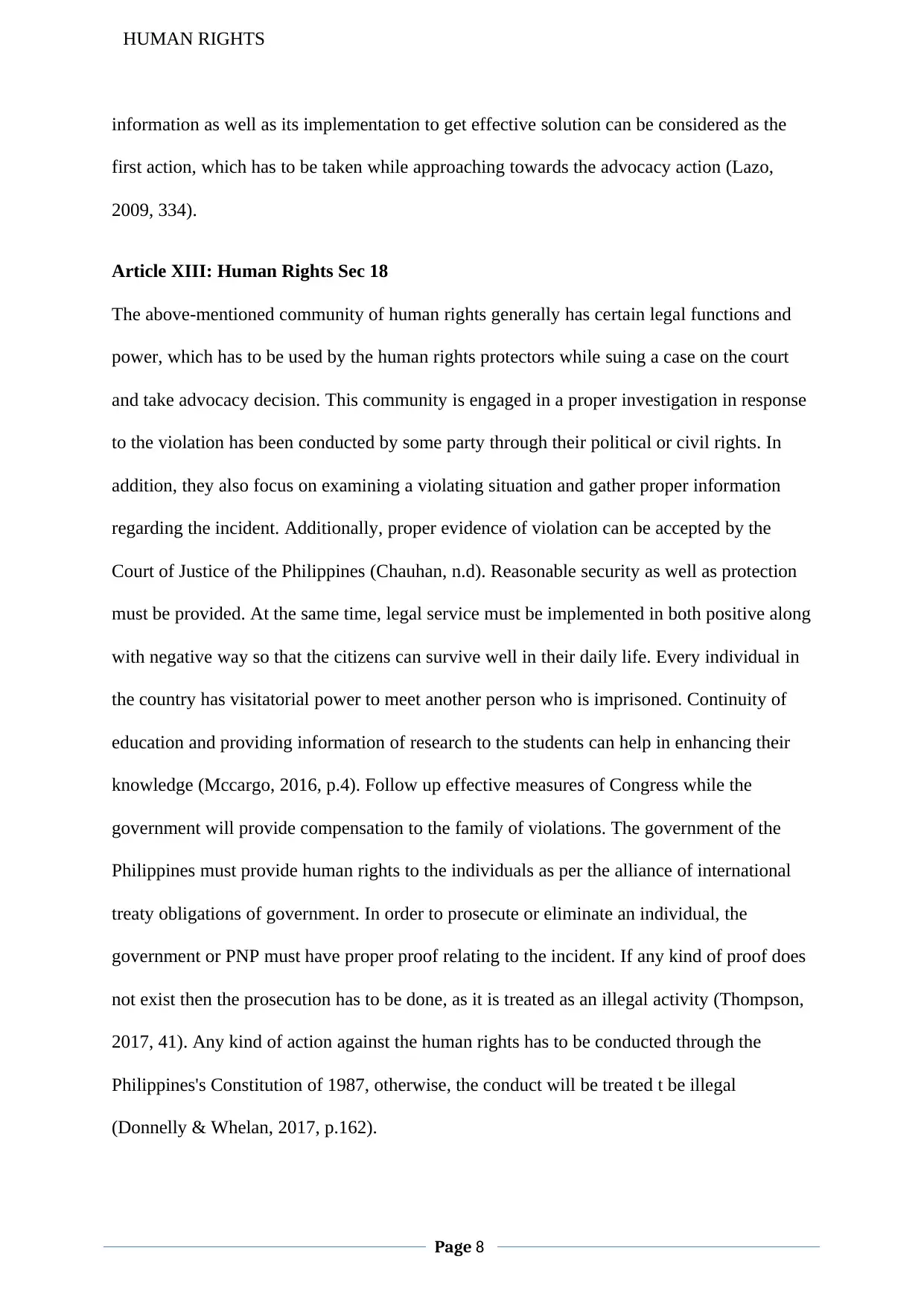
HUMAN RIGHTS
information as well as its implementation to get effective solution can be considered as the
first action, which has to be taken while approaching towards the advocacy action (Lazo,
2009, 334).
Article XIII: Human Rights Sec 18
The above-mentioned community of human rights generally has certain legal functions and
power, which has to be used by the human rights protectors while suing a case on the court
and take advocacy decision. This community is engaged in a proper investigation in response
to the violation has been conducted by some party through their political or civil rights. In
addition, they also focus on examining a violating situation and gather proper information
regarding the incident. Additionally, proper evidence of violation can be accepted by the
Court of Justice of the Philippines (Chauhan, n.d). Reasonable security as well as protection
must be provided. At the same time, legal service must be implemented in both positive along
with negative way so that the citizens can survive well in their daily life. Every individual in
the country has visitatorial power to meet another person who is imprisoned. Continuity of
education and providing information of research to the students can help in enhancing their
knowledge (Mccargo, 2016, p.4). Follow up effective measures of Congress while the
government will provide compensation to the family of violations. The government of the
Philippines must provide human rights to the individuals as per the alliance of international
treaty obligations of government. In order to prosecute or eliminate an individual, the
government or PNP must have proper proof relating to the incident. If any kind of proof does
not exist then the prosecution has to be done, as it is treated as an illegal activity (Thompson,
2017, 41). Any kind of action against the human rights has to be conducted through the
Philippines's Constitution of 1987, otherwise, the conduct will be treated t be illegal
(Donnelly & Whelan, 2017, p.162).
Page 8
information as well as its implementation to get effective solution can be considered as the
first action, which has to be taken while approaching towards the advocacy action (Lazo,
2009, 334).
Article XIII: Human Rights Sec 18
The above-mentioned community of human rights generally has certain legal functions and
power, which has to be used by the human rights protectors while suing a case on the court
and take advocacy decision. This community is engaged in a proper investigation in response
to the violation has been conducted by some party through their political or civil rights. In
addition, they also focus on examining a violating situation and gather proper information
regarding the incident. Additionally, proper evidence of violation can be accepted by the
Court of Justice of the Philippines (Chauhan, n.d). Reasonable security as well as protection
must be provided. At the same time, legal service must be implemented in both positive along
with negative way so that the citizens can survive well in their daily life. Every individual in
the country has visitatorial power to meet another person who is imprisoned. Continuity of
education and providing information of research to the students can help in enhancing their
knowledge (Mccargo, 2016, p.4). Follow up effective measures of Congress while the
government will provide compensation to the family of violations. The government of the
Philippines must provide human rights to the individuals as per the alliance of international
treaty obligations of government. In order to prosecute or eliminate an individual, the
government or PNP must have proper proof relating to the incident. If any kind of proof does
not exist then the prosecution has to be done, as it is treated as an illegal activity (Thompson,
2017, 41). Any kind of action against the human rights has to be conducted through the
Philippines's Constitution of 1987, otherwise, the conduct will be treated t be illegal
(Donnelly & Whelan, 2017, p.162).
Page 8
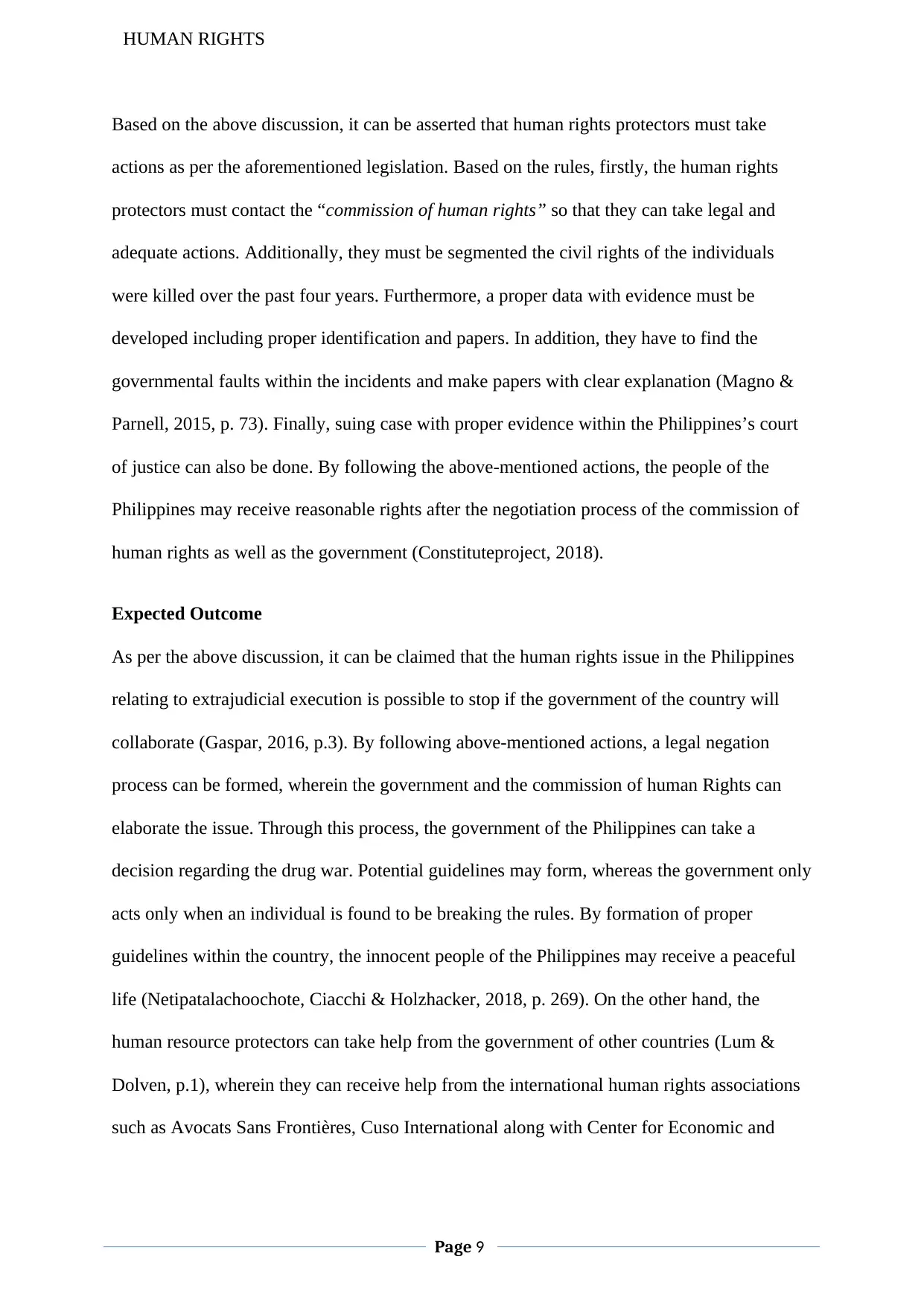
HUMAN RIGHTS
Based on the above discussion, it can be asserted that human rights protectors must take
actions as per the aforementioned legislation. Based on the rules, firstly, the human rights
protectors must contact the “commission of human rights” so that they can take legal and
adequate actions. Additionally, they must be segmented the civil rights of the individuals
were killed over the past four years. Furthermore, a proper data with evidence must be
developed including proper identification and papers. In addition, they have to find the
governmental faults within the incidents and make papers with clear explanation (Magno &
Parnell, 2015, p. 73). Finally, suing case with proper evidence within the Philippines’s court
of justice can also be done. By following the above-mentioned actions, the people of the
Philippines may receive reasonable rights after the negotiation process of the commission of
human rights as well as the government (Constituteproject, 2018).
Expected Outcome
As per the above discussion, it can be claimed that the human rights issue in the Philippines
relating to extrajudicial execution is possible to stop if the government of the country will
collaborate (Gaspar, 2016, p.3). By following above-mentioned actions, a legal negation
process can be formed, wherein the government and the commission of human Rights can
elaborate the issue. Through this process, the government of the Philippines can take a
decision regarding the drug war. Potential guidelines may form, whereas the government only
acts only when an individual is found to be breaking the rules. By formation of proper
guidelines within the country, the innocent people of the Philippines may receive a peaceful
life (Netipatalachoochote, Ciacchi & Holzhacker, 2018, p. 269). On the other hand, the
human resource protectors can take help from the government of other countries (Lum &
Dolven, p.1), wherein they can receive help from the international human rights associations
such as Avocats Sans Frontières, Cuso International along with Center for Economic and
Page 9
Based on the above discussion, it can be asserted that human rights protectors must take
actions as per the aforementioned legislation. Based on the rules, firstly, the human rights
protectors must contact the “commission of human rights” so that they can take legal and
adequate actions. Additionally, they must be segmented the civil rights of the individuals
were killed over the past four years. Furthermore, a proper data with evidence must be
developed including proper identification and papers. In addition, they have to find the
governmental faults within the incidents and make papers with clear explanation (Magno &
Parnell, 2015, p. 73). Finally, suing case with proper evidence within the Philippines’s court
of justice can also be done. By following the above-mentioned actions, the people of the
Philippines may receive reasonable rights after the negotiation process of the commission of
human rights as well as the government (Constituteproject, 2018).
Expected Outcome
As per the above discussion, it can be claimed that the human rights issue in the Philippines
relating to extrajudicial execution is possible to stop if the government of the country will
collaborate (Gaspar, 2016, p.3). By following above-mentioned actions, a legal negation
process can be formed, wherein the government and the commission of human Rights can
elaborate the issue. Through this process, the government of the Philippines can take a
decision regarding the drug war. Potential guidelines may form, whereas the government only
acts only when an individual is found to be breaking the rules. By formation of proper
guidelines within the country, the innocent people of the Philippines may receive a peaceful
life (Netipatalachoochote, Ciacchi & Holzhacker, 2018, p. 269). On the other hand, the
human resource protectors can take help from the government of other countries (Lum &
Dolven, p.1), wherein they can receive help from the international human rights associations
such as Avocats Sans Frontières, Cuso International along with Center for Economic and
Page 9
⊘ This is a preview!⊘
Do you want full access?
Subscribe today to unlock all pages.

Trusted by 1+ million students worldwide
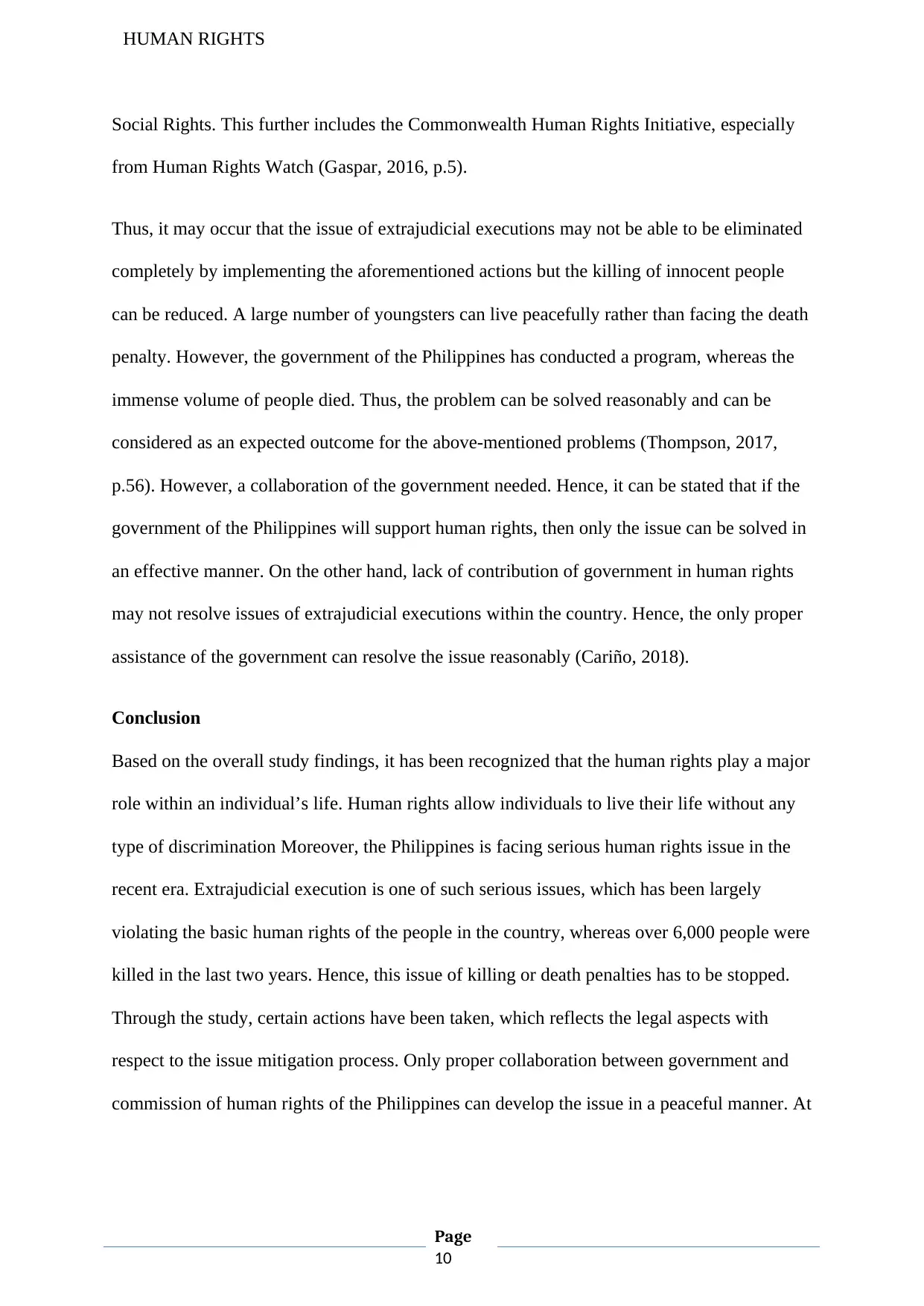
HUMAN RIGHTS
Social Rights. This further includes the Commonwealth Human Rights Initiative, especially
from Human Rights Watch (Gaspar, 2016, p.5).
Thus, it may occur that the issue of extrajudicial executions may not be able to be eliminated
completely by implementing the aforementioned actions but the killing of innocent people
can be reduced. A large number of youngsters can live peacefully rather than facing the death
penalty. However, the government of the Philippines has conducted a program, whereas the
immense volume of people died. Thus, the problem can be solved reasonably and can be
considered as an expected outcome for the above-mentioned problems (Thompson, 2017,
p.56). However, a collaboration of the government needed. Hence, it can be stated that if the
government of the Philippines will support human rights, then only the issue can be solved in
an effective manner. On the other hand, lack of contribution of government in human rights
may not resolve issues of extrajudicial executions within the country. Hence, the only proper
assistance of the government can resolve the issue reasonably (Cariño, 2018).
Conclusion
Based on the overall study findings, it has been recognized that the human rights play a major
role within an individual’s life. Human rights allow individuals to live their life without any
type of discrimination Moreover, the Philippines is facing serious human rights issue in the
recent era. Extrajudicial execution is one of such serious issues, which has been largely
violating the basic human rights of the people in the country, whereas over 6,000 people were
killed in the last two years. Hence, this issue of killing or death penalties has to be stopped.
Through the study, certain actions have been taken, which reflects the legal aspects with
respect to the issue mitigation process. Only proper collaboration between government and
commission of human rights of the Philippines can develop the issue in a peaceful manner. At
Page
10
Social Rights. This further includes the Commonwealth Human Rights Initiative, especially
from Human Rights Watch (Gaspar, 2016, p.5).
Thus, it may occur that the issue of extrajudicial executions may not be able to be eliminated
completely by implementing the aforementioned actions but the killing of innocent people
can be reduced. A large number of youngsters can live peacefully rather than facing the death
penalty. However, the government of the Philippines has conducted a program, whereas the
immense volume of people died. Thus, the problem can be solved reasonably and can be
considered as an expected outcome for the above-mentioned problems (Thompson, 2017,
p.56). However, a collaboration of the government needed. Hence, it can be stated that if the
government of the Philippines will support human rights, then only the issue can be solved in
an effective manner. On the other hand, lack of contribution of government in human rights
may not resolve issues of extrajudicial executions within the country. Hence, the only proper
assistance of the government can resolve the issue reasonably (Cariño, 2018).
Conclusion
Based on the overall study findings, it has been recognized that the human rights play a major
role within an individual’s life. Human rights allow individuals to live their life without any
type of discrimination Moreover, the Philippines is facing serious human rights issue in the
recent era. Extrajudicial execution is one of such serious issues, which has been largely
violating the basic human rights of the people in the country, whereas over 6,000 people were
killed in the last two years. Hence, this issue of killing or death penalties has to be stopped.
Through the study, certain actions have been taken, which reflects the legal aspects with
respect to the issue mitigation process. Only proper collaboration between government and
commission of human rights of the Philippines can develop the issue in a peaceful manner. At
Page
10
Paraphrase This Document
Need a fresh take? Get an instant paraphrase of this document with our AI Paraphraser
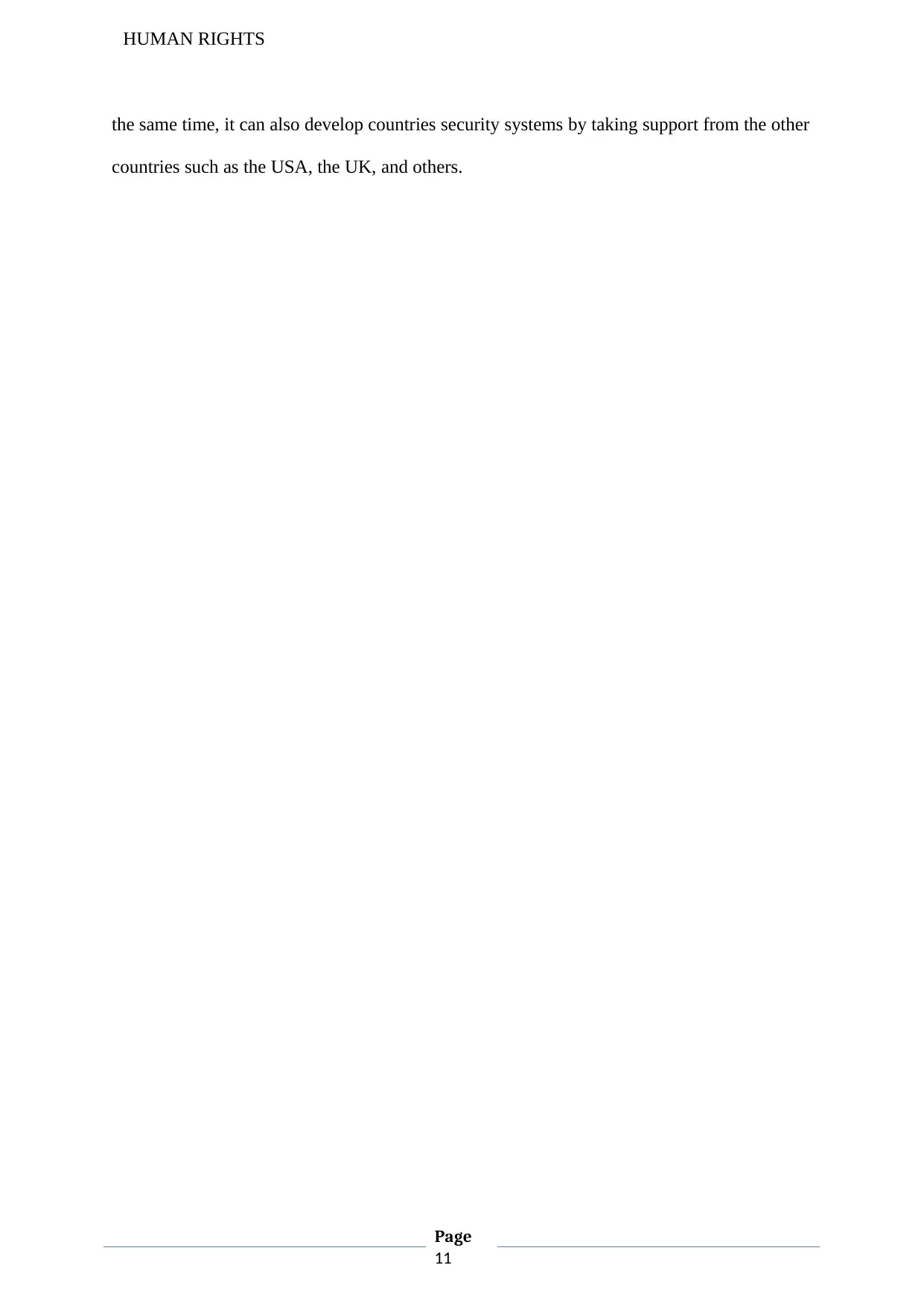
HUMAN RIGHTS
the same time, it can also develop countries security systems by taking support from the other
countries such as the USA, the UK, and others.
Page
11
the same time, it can also develop countries security systems by taking support from the other
countries such as the USA, the UK, and others.
Page
11
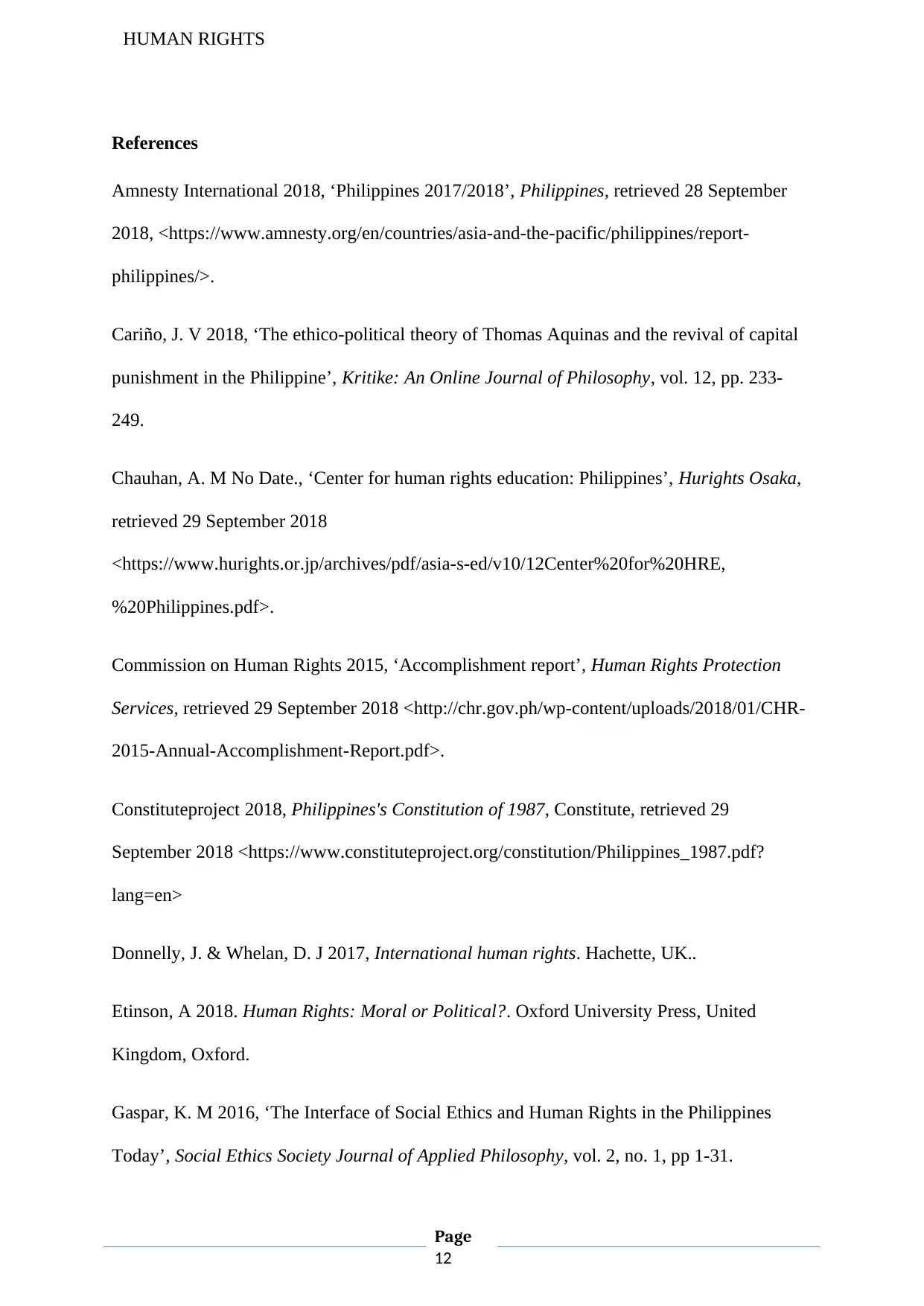
HUMAN RIGHTS
References
Amnesty International 2018, ‘Philippines 2017/2018’, Philippines, retrieved 28 September
2018, <https://www.amnesty.org/en/countries/asia-and-the-pacific/philippines/report-
philippines/>.
Cariño, J. V 2018, ‘The ethico-political theory of Thomas Aquinas and the revival of capital
punishment in the Philippine’, Kritike: An Online Journal of Philosophy, vol. 12, pp. 233-
249.
Chauhan, A. M No Date., ‘Center for human rights education: Philippines’, Hurights Osaka,
retrieved 29 September 2018
<https://www.hurights.or.jp/archives/pdf/asia-s-ed/v10/12Center%20for%20HRE,
%20Philippines.pdf>.
Commission on Human Rights 2015, ‘Accomplishment report’, Human Rights Protection
Services, retrieved 29 September 2018 <http://chr.gov.ph/wp-content/uploads/2018/01/CHR-
2015-Annual-Accomplishment-Report.pdf>.
Constituteproject 2018, Philippines's Constitution of 1987, Constitute, retrieved 29
September 2018 <https://www.constituteproject.org/constitution/Philippines_1987.pdf?
lang=en>
Donnelly, J. & Whelan, D. J 2017, International human rights. Hachette, UK..
Etinson, A 2018. Human Rights: Moral or Political?. Oxford University Press, United
Kingdom, Oxford.
Gaspar, K. M 2016, ‘The Interface of Social Ethics and Human Rights in the Philippines
Today’, Social Ethics Society Journal of Applied Philosophy, vol. 2, no. 1, pp 1-31.
Page
12
References
Amnesty International 2018, ‘Philippines 2017/2018’, Philippines, retrieved 28 September
2018, <https://www.amnesty.org/en/countries/asia-and-the-pacific/philippines/report-
philippines/>.
Cariño, J. V 2018, ‘The ethico-political theory of Thomas Aquinas and the revival of capital
punishment in the Philippine’, Kritike: An Online Journal of Philosophy, vol. 12, pp. 233-
249.
Chauhan, A. M No Date., ‘Center for human rights education: Philippines’, Hurights Osaka,
retrieved 29 September 2018
<https://www.hurights.or.jp/archives/pdf/asia-s-ed/v10/12Center%20for%20HRE,
%20Philippines.pdf>.
Commission on Human Rights 2015, ‘Accomplishment report’, Human Rights Protection
Services, retrieved 29 September 2018 <http://chr.gov.ph/wp-content/uploads/2018/01/CHR-
2015-Annual-Accomplishment-Report.pdf>.
Constituteproject 2018, Philippines's Constitution of 1987, Constitute, retrieved 29
September 2018 <https://www.constituteproject.org/constitution/Philippines_1987.pdf?
lang=en>
Donnelly, J. & Whelan, D. J 2017, International human rights. Hachette, UK..
Etinson, A 2018. Human Rights: Moral or Political?. Oxford University Press, United
Kingdom, Oxford.
Gaspar, K. M 2016, ‘The Interface of Social Ethics and Human Rights in the Philippines
Today’, Social Ethics Society Journal of Applied Philosophy, vol. 2, no. 1, pp 1-31.
Page
12
⊘ This is a preview!⊘
Do you want full access?
Subscribe today to unlock all pages.

Trusted by 1+ million students worldwide
1 out of 14
Related Documents
Your All-in-One AI-Powered Toolkit for Academic Success.
+13062052269
info@desklib.com
Available 24*7 on WhatsApp / Email
![[object Object]](/_next/static/media/star-bottom.7253800d.svg)
Unlock your academic potential
Copyright © 2020–2026 A2Z Services. All Rights Reserved. Developed and managed by ZUCOL.





